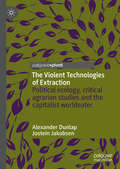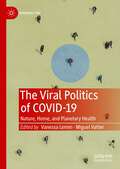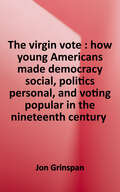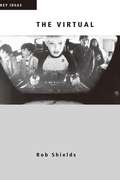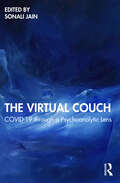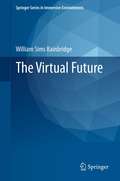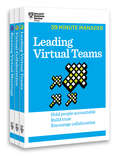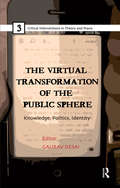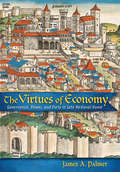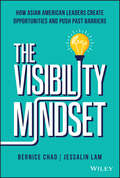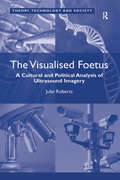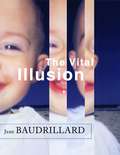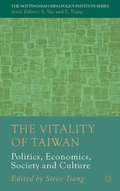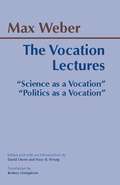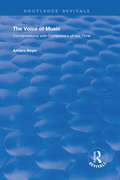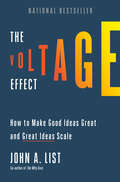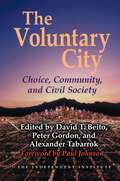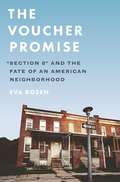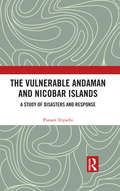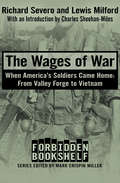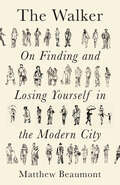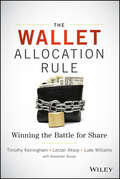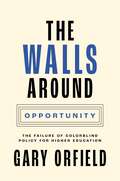- Table View
- List View
The Violent Technologies of Extraction: Political ecology, critical agrarian studies and the capitalist worldeater
by Alexander Dunlap Jostein JakobsenOffering a thought provoking theoretical conversation around ecological crisis and natural resource extraction, this book suggests that we are on a trajectory geared towards total extractivism guided by the mythological Worldeater. The authors discuss why and how we have come to live in this catastrophic predicament, rooting the present in an original perspective that animates the forces of global techno-capitalist development. They argue that the Worldeater helps us make sense of the insatiable forces that transform, convert and consume the world. The book combines this unique approach with detailed academic review of critical agrarian studies and political ecology, the militarization of nature and the conventional and ‘green’ extraction nexus. It seeks radical reflection on the role people play in the construction and perpetuation of these crises, and concludes with some suggestions on how to tackle them.
The Viral Politics of Covid-19: Nature, Home, and Planetary Health (Biolegalities)
by Vanessa Lemm Miguel VatterThis book critically examines the COVID-19 pandemic and its legal and biological governance using a multidisciplinary approach. The perspectives reflected in this volume investigate the imbrications between technosphere and biosphere at social, economic, and political levels. The biolegal dimensions of our evolving understanding of “home” are analysed as the common thread linking the problem of zoonotic diseases and planetary health with that of geopolitics, biosecurity, bioeconomics and biophilosophies of the plant-animal-human interface. In doing so, the contributions collectively highlight the complexities, challenges, and opportunities for humanity, opening new perspectives on how to inhabit our shared planet. This volume will broadly appeal to scholars and students in anthropology, cultural and media studies, history, philosophy, political science and public health, sociology and science and technology studies.
The Virgin Vote: How Young Americans Made Democracy Social, Politics Personal, and Voting Popular in the Nineteenth Century
by Jon GrinspanThere was a time when young people were the most passionate participants in American democracy. In the second half of the nineteenth century--as voter turnout reached unprecedented peaks--young people led the way, hollering, fighting, and flirting at massive midnight rallies. Parents trained their children to be "violent little partisans," while politicians lobbied twenty-one-year-olds for their "virgin votes"--the first ballot cast upon reaching adulthood. In schoolhouses, saloons, and squares, young men and women proved that democracy is social and politics is personal, earning their adulthood by participating in public life. Drawing on hundreds of diaries and letters of diverse young Americans--from barmaids to belles, sharecroppers to cowboys--this book explores how exuberant young people and scheming party bosses relied on each other from the 1840s to the turn of the twentieth century. It also explains why this era ended so dramatically and asks if aspects of that strange period might be useful today. In a vivid evocation of this formative but forgotten world, Jon Grinspan recalls a time when struggling young citizens found identity and maturity in democracy.
The Virtual (Key Ideas)
by Rob ShieldsThis book looks at the origins and the many contemporary meanings of the virtual. Rob Shields shows how the construction of virtual worlds has a long history. He examines the many forms of faith and hysteria that have surrounded computer technologies in recent years. Moving beyond the technologies themselves he shows how the virtual plays a role in our daily lives at every level. The virtual is also an essential concept needed to manage innovation and risk. It is real but not actual, ideal but not abstract. The virtual, he argues, has become one of the key organizing principles of contemporary society in the public realms of politics, business and consumption as well as in our private lives.
The Virtual Couch: COVID-19 through a Psychoanalytic Lens
by Sonali JainThis book is one of the first systematic examinations on the looming mental health crisis emerging from the COVID-19 pandemic from a psychoanalytic perspective. Bringing together practising therapists from Asia and Europe, this book: • analyses themes like anxiety, depression, sexuality, loss and death through clinical vignettes • highlights how children, adolescents and adults have been responding to the pandemic • explores how personal and collective trauma are mourned, remembered, repeated and worked through • studies deep-seated prejudices and fears • focuses on how the pandemic has stimulated exceptional manifestations of human solidarity and creativity Comprehensive and practical, this book will be an essential guide for mental health professionals, counsellors, therapists and medical doctors treating psychological trauma.
The Virtual Future
by William Sims BainbridgeThe newest communication technologies are profoundly changing the world's politics, economies, and cultures, but the specific implications of online game worlds remain mysterious. The Virtual Future employs theories and methods from social science to explore nine very different virtual futures: The Matrix Online, Tabula Rasa, Anarchy Online, Entropia Universe, Star Trek Online, EVE Online, Star Wars Galaxies, World of Warcraft: Burning Crusade, and The Chronicles of Riddick. Each presents a different picture of how technology and society could evolve in coming centuries, but one theme runs through all of them, the attempt to escape the Earth and seek new destinies among the stars. Four decades after the last trip to the moon, a new conception of spaceflight is emerging. Rather than rockets shooting humans across vast physical distances to sterile rocks that lack the resources to sustain life, perhaps robot space probes and orbiting telescopes will glean information about the universe, that humans can then experience inside computer-generated environments much closer to home. All nine of these fantastically rich multiplayer masterpieces have shown myriads of people that really radical alternatives to contemporary society could exist, and has served as a laboratory for examining the consequences. Each is a prototype of new social forms, a utopian subculture, and a simulation of technologies that have yet to be invented. They draw upon several different traditions of science fiction and academic philosophy, and they were created in several nations. By comparing these nine role-playing fantasies, we can better consider what kind of world we want to inhabit in the real future.
The Virtual Manager Collection (3 Books) (HBR 20-Minute Manager Series)
by Harvard Business ReviewToday we have greater control over where and when we work. As our businesses spread across the world and technology makes it easy to do our jobs from anywhere there's Wi-Fi, more of us have the option to go remote. But that doesn't mean we're good at it. Whether you're calling in from a home office every day or one of your team members occasionally logs in from the quiet car on a train, distance can make collaboration more difficult. Remote work gives teams flexibility and options, but when you're not face-to-face with colleagues, it's difficult to set and manage expectations, deal with inevitable tech glitches, keep your people (and yourself) motivated and engaged, and infuse warmth and personality into the blunt communication tools you're using.The Virtual Manager Collection gives you the solutions you need to be productive, whether you're managing a team, a project, or just your own work. This specially priced three-volume set includes Virtual Collaboration, Running Virtual Meetings, and Leading Virtual Teams.Tips and strategies cover: getting your technology up and running-and keeping it there building and maintaining relationships from afar communicating well through a variety of media running productive virtual meetings setting and managing expectations for your work leading geographically dispersed teamsThis set has the practical advice, insights, and tools you need to work well, no matter where you are.Don't have much time? Get up to speed fast on the most essential business skills with HBR's 20-Minute Manager series. Whether you need a crash course or a brief refresher, each book in the series is a concise, practical primer that will help you brush up on a key management topic. Advice you can quickly read and apply, for ambitious professionals and aspiring executives-from the most trusted source in business. Also available as an ebook.
The Virtual Transformation of the Public Sphere: Knowledge, Politics, Identity (Critical Interventions In Theory And Praxis Ser.)
by Gaurav DesaiThis book explores how new media technologies such as e-mails, online forums, blogs and social networking sites have helped shape new forms of public spheres. Offering new readings of Jürgen Habermas’s notion of the public sphere, scholars from diverse disciplines interrogate the power and possibilities of new media in creating and disseminating public information; changing human communication at the interpersonal, institutional and societal levels; and affecting our self-fashioning as private and public individuals. Beginning with philosophical approaches to the subject, the book goes on to explore the innovative deployment of new media in areas as diverse as politics, social activism, piracy, sexuality, ethnic identity and education. The book will immensely interest those in media, culture and gender studies, philosophy, political science, sociology and anthropology.
The Virtues of Economy: Governance, Power, and Piety in Late Medieval Rome
by James A. PalmerThe humanist perception of fourteenth-century Rome as a slumbering ruin awaiting the Renaissance and the return of papal power has cast a long shadow on the historiography of the city. Challenging this view, James A. Palmer argues that Roman political culture underwent dramatic changes in the late Middle Ages, with profound and lasting implications for city's subsequent development. The Virtues of Economy examines the transformation of Rome's governing elites as a result of changes in the city's economic, political, and spiritual landscape.Palmer explores this shift through the history of Roman political society, its identity as an urban commune, and its once-and-future role as the spiritual capital of Latin Christendom. Tracing the contours of everyday Roman politics, The Virtues of Economy reframes the reestablishment of papal sovereignty in Rome as the product of synergy between papal ambitions and local political culture. More broadly, Palmer emphasizes Rome's distinct role in evolution of medieval Italy's city-communes.
The Visibility Mindset: How Asian American Leaders Create Opportunities and Push Past Barriers
by Bernice M. Chao Jessalin LamExplore the challenges faced by Asian professionals and how to overcome them. &“A must-read if you&’re ready to unlock your full potential!&” —Tiffany Pham, Founder and CEO, MogulFind your voice, own your story, and elevate your professional life. In The Visibility Mindset: How Asian American Leaders Create Opportunities and Push Past Barriers, Chao and Lam deliver an engaging and enlightening treatment of how Asian American professional leaders have powered through the obstacles in their way. Exploring a variety of myths, stereotypes, and problems faced by Asian American professionals, this book will empower you to overcome many of these issues. The Visibility Mindset offers straightforward exercises and strategies, alongside many real-life leadership examples from various industries, to help you succeed as you move forward in your careers. The book explores how to work with others effectively and how to handle microaggressions, how to leverage the power of networking, and how to manage and mentor others while seeking out mentorship for yourself. An indispensable resource for Asian professionals, The Visibility Mindset also deserves a place in the hands of allies of Asian American professionals seeking a deeper understanding of the challenges faced by their friends and colleagues.
The Visual Language of Technique
by Luigi CocchiarellaThe book is inspired by the third seminar in a cycle connected to the celebrations of the 150th anniversary of the Politecnico di Milano (July 2013). "Educating by Image. Teaching Styles vs Learning Styles" was the motto of this meeting. The contributions (coming from lectures, the poster session, interviews and round table) aim to propose an updated look at visual education, highlighting how digital tools and networks have profoundly affected the "representational styles" of the teachers and the "cognitive styles" of the learners, while at the same time reaffirming the importance of the interaction between the two groups. As Herbert Alexander Simon once said, "Learning results. . . only from what the student does and thinks"; therefore "the teacher can advance learning only by influencing what the student does to learn". That is no mean feat if we consider that, according to Benjamin Samuel Bloom, visual education not only involves the pure cognition, but also the affective and the psychomotor domains, not to mention the social aspects. This is why, alongside some theoretical and historical retrospectives, the contributions recommend a continuous revision of "what" and "how" could be included in the academic curricula, also in connection with secondary schools, the professional world, targeted Lifelong Learning Programmes for students and teachers. The volume includes an interview with the science journalist and writer Piero Angela.
The Visualised Foetus: A Cultural and Political Analysis of Ultrasound Imagery (Theory, Technology And Society Ser.)
by Julie RobertsThe latest three- and four dimensional images produced by modern ultrasound technology offer strikingly realistic representations of the foetus - representations that have further transformed experiences of pregnancy, the public understanding of foetal existence and the rhetoric of the abortion debate. Presenting a timely feminist engagement with this new technology, The Visualised Foetus explores the widespread familiarity with and popularity of this new technology within the context of a longer history of foetal visualisations. The book offers an array of case studies that examine the diffusion of 3/4D ultrasound images beyond the clinic and the implications of this new technology for biopolitics in the European and American context. With attention to the non-diagnostic and commercial use of 3/4D images, the impact of 3/4D ultrasound within the abortion debate, and new claims that ultrasound aids maternal-foetal bonding, The Visualised Foetus demonstrates the tension between the social and medical significances of foetal ultrasound, the pleasures and dangers of foetal imagery for women, the contested status of ultrasonography as 'scientific' imagery, and struggles over the authority to define and interpret ultrasound imagery. As such, it will appeal to scholars of the sociology of medicine and the body, social theory and gender and cultural studies, as well as those with interest in science and technology studies.
The Vital Illusion (The Wellek Library Lectures)
by Jean BaudrillardAren't we actually sick of sex, of difference, of emancipation, of culture? With this provocative taunt, the indomitable sociologist Jean Baudrillard challenges us to face up to our deadly, technologically empowered renunciation of mortality and subjectivity as he grapples with the complex issues that define our postmillennial world. What does the advent and proliferation of cloning mean for our sense of ourselves as human beings? What does the turn of the millennium say about our relation to time and history? What does the instantaneous, virtual realm of cyberspace do to reality? In The Vital Illusion—as always—Baudrillard leads his readers to some surprising conclusions.Baudrillard considers how human cloning—as well as the "cloning" of ideas and social identities—heralds an end to sex and death and the divagations of living by instituting a realm of the Same, beyond the struggles of individuation. In this day and age when everything can be cloned, simulated, programmed, and genetically and neurologically managed, humanity shows itself unable to brave its own diversity, preferring instead to regress to the pathological eternity of self-replicating cells. By reverting to our viral origins as sexless immortal beings, we are, ironically, fulfilling a death wish, putting an end to our own species as we know it. Next, Baudrillard explores the "nonevent" that was and is the turn of the millennium. He provocatively puts forward the thesis that the arrival of the year 2000 could never take place because we could neither resolve nor leave behind our history, nor could we stop counting down toward our future. For Baudrillard, the millennial clock reading to the millionth of a second on its way to zero is the perfect symbol of our time: history decays rather than progresses. In closing, Baudrillard examines what he calls "the murder of the real" by the virtual. In a world of copies and clones in which everything can be made present in an instant by technology, we can no longer even speak of reality. Beyond Nietzsche's symbolic murder of God, our virtual world free of referents is in the process of exterminating reality, leaving no trace: "The corps(e) of the Real—if there is any—has not been recovered, is nowhere to be found."Peppered with Baudrillard's signature counterintuitive moves, prophetic visions, and dark humor, The Vital Illusion exposes the contradictions that guide our contemporary culture and rule our lives.
The Vitality of Taiwan
by Steve TsangAs a country, Taiwan is one of the most vibrant, exciting, colourful and entrepreneurial on earth. The contributors reveal what underpins the vitality of Taiwan, examining the relevance of its democratic politics, civil society and the presence of an existential threat from China, as well as the importance of its international business nexus.
The Vocation Lectures
by Max Weber David Owen Tracy B. Strong Rodney LivingstoneOriginally published separately, Weber's Science as a Vocation and Politics as a Vocation stand as the classic formulations of his positions on two related subjects that go to the heart of his thought: the nature and status of science and its claims to authority; and the nature and status of political claims and the ultimate justification for such claims. Together in this volume, these newly translated lectures offer an ideal point of entry into Weber's central project: understanding how, as Weber put it, "in the West alone there have appeared cultural manifestations [that seem to] go in the direction of universal significance and validity.
The Voice of Music: Conversations with Composers of Our Time
by Anders BeyerThis title was first published in 2000. Extensive and generously illustrated interviews have been a feature of the lively Danish music periodical "Dansk Musik Tidsskrift" (Danish Music Review) since the 1960s. Now a long-standing tradition, these "conversations" with influential composers from all over the world are prepared by professional musicians and experienced writers on music. This volume is a collection of interviews selected from issues published since 1990 by Anders Beyer, the journal's editor-in-chief. The book gives an up-to-date picture of the North European musical perspectives through interviews with composers from each of the Nordic countries. These are further complemented by interviews with trend-setting composers from the rest of Europe and America. The interviews have been edited and translated into English to make them accessible to a wider audience. The volume features interviews with composers including Erik Bergman, Tikhon Chrennikov, Edison Denisov, Hans Gerfors, Philip Glass, Sofia Gubaidulina and Pelle Gudmundsen-Holmgreen.
The Voltage Effect: How to Make Good Ideas Great and Great Ideas Scale
by John A. ListA leading economist answers one of today&’s trickiest questions: Why do some great ideas make it big while others fail to take off? &“Brilliant, practical, and grounded in the very latest research, this is by far the best book I&’ve ever read on the how and why of scaling.&”—Angela Duckworth, CEO of Character Lab and New York Times bestselling author of GritONE OF THE MOST ANTICIPATED BOOKS OF 2022—Men&’s Journal&“Scale&” has become a favored buzzword in the startup world. But scale isn't just about accumulating more users or capturing more market share. It's about whether an idea that takes hold in a small group can do the same in a much larger one—whether you&’re growing a small business, rolling out a diversity and inclusion program, or delivering billions of doses of a vaccine. Translating an idea into widespread impact, says University of Chicago economist John A. List, depends on one thing only: whether it can achieve &“high voltage&”—the ability to be replicated at scale. In The Voltage Effect, List explains that scalable ideas share a common set of attributes, while any number of attributes can doom an unscalable idea. Drawing on his original research, as well as fascinating examples from the realms of business, policymaking, education, and public health, he identifies five measurable vital signs that a scalable idea must possess, and offers proven strategies for avoiding voltage drops and engineering voltage gains. You&’ll learn: • How celebrity chef Jamie Oliver expanded his restaurant empire by focusing on scalable &“ingredients&” (until it collapsed because talent doesn&’t scale) • Why the failure to detect false positives early on caused the Reagan-era drug-prevention program to backfire at scale • How governments could deliver more services to more citizens if they focused on the last dollar spent • How one education center leveraged positive spillovers to narrow the achievement gap across the entire community • Why the right set of incentives, applied at scale, can boost voter turnout, increase clean energy use, encourage patients to consistently take their prescribed medication, and more. By understanding the science of scaling, we can drive change in our schools, workplaces, communities, and society at large. Because a better world can only be built at scale.
The Voluntary City: Choice, Community, and Civil Society
by David T. Beito, Peter Gordon and Alexander TabarrokAssembling a rich history and analysis of large-scale, private and voluntary, community-based provision of social services, urban infrastructure, and community governance, this book provides suggestions on how to restore the vitality of city life.Historically, the city was considered a center of commerce, knowledge and culture, a haven for safety and a place of opportunity. Today, however, cities are widely viewed as centers for crime, homelessness, poverty, unemployment, traffic, pollution, and other social ills. In many cities, government increasingly dominates life, consuming vast resources to cater to special interest groups. Decision-making has become intensely politicized, bureaucratic, and largely unaccountable to the populace. The Voluntary City provides a rich history and analysis of private, locally based provision of social services, urban infrastructure, and community governance. Such systems have offered superior education, transportation, housing, crime control, recreation, health care, and employment by being more effective, innovative, and responsive than those provided through special interest politics and bureaucracy. The Voluntary City reveals how the process of providing local public goods through the dynamism of freely competitive, market-based entrepreneurship is unmatched in renewing communities and strengthening the bonds of civil society. A refreshing challenge to the orthodoxy that government alone can improve community life, The Voluntary City will be an essential reference for anyone interested in the future of cities, including scholars and students, policy-makers, civic and business leaders, and urban citizens.
The Voucher Promise: "Section 8" and the Fate of an American Neighborhood
by Eva RosenAn in-depth look at America’s largest rental assistance program and how it shapes the lives of residents in one low-income Baltimore neighborhoodHousing vouchers are a cornerstone of US federal housing policy, offering aid to more than two million households. Vouchers are meant to provide the poor with increased choice in the private rental marketplace, enabling access to safe neighborhoods with good schools and higher-paying jobs. But do they?The Voucher Promise examines the Housing Choice Voucher Program, colloquially known as “Section 8,” and how it shapes the lives of families living in a Baltimore neighborhood called Park Heights. Eva Rosen tells stories about the daily lives of homeowners, voucher holders, renters who receive no housing assistance, and the landlords who provide housing. While vouchers are a powerful tool with great promise, she demonstrates how the housing policy can replicate the very inequalities it has the power to solve.Rosen spent more than a year living in Park Heights, sitting on front stoops, getting to know families, accompanying them on housing searches, speaking to landlords, and learning about the neighborhood’s history. Voucher holders disproportionately end up in this area despite rampant unemployment, drugs, crime, and abandoned housing. Exploring why they are unable to relocate to other neighborhoods, Rosen illustrates the challenges in obtaining vouchers and the difficulties faced by recipients in using them when and where they want to. Yet, despite the program’s real shortcomings, she argues that vouchers offer basic stability for families and should remain integral to solutions for the nation’s housing crisis.Delving into the connections between safe, affordable housing and social mobility, The Voucher Promise investigates the profound benefits and formidable obstacles involved in housing America’s poor.
The Vulnerable Andaman and Nicobar Islands: A Study of Disasters and Response
by Poonam TripathiThis first full-length book addresses disasters in the context of vulnerability of the Andaman and Nicobar Islands that comprise 572 islands in the Bay of Bengal. It looks at the disasters that the islands have experienced in the last 200 years and analyzes major disasters since colonization by the British. Raising some critical questions, this book attempts to understand the overall profile of disasters – the facts, causes, damage, response and recovery – in the Andaman and Nicobar Islands. It discusses earthquakes, cyclones, tsunami and epidemics, as well as impacts of World War II, the penal colony and the post-Independence resettlement on the tribal population. The work will serve as a rich resource with its detailed tables, figures, maps and diagrams; appendices; and database ranging from travelogues, Census of India reports and fieldwork to Right to Information (RTI) petitions that collect hitherto unknown facts. The book will be useful to students of geography, disasters and disasters management, climate and environmental studies, history, sociology, island and ocean studies, and South Asian studies.
The Wages of War: When America's Soldiers Came Home: From Valley Forge to Vietnam (Forbidden Bookshelf #20)
by Richard Severo Lewis MilfordA disturbing chronicle of the US government&’s mistreatment of American soldiers and veterans throughout history, with a new introduction by Charles Sheehan-Miles Time and time again, the sacrifices made by veterans and their families have been repaid with scorn, discrimination, lack of health services, scant financial compensation, and other indignities. This injustice dates back as far as the American Revolution, when troops came home penniless and without prospects for work, yet had to wait decades before the government paid them the wages they were owed. When soldiers returned from the Cuban campaign after the Spanish-American War, they were riddled with malaria, typhoid, yellow fever, and dysentery—but the government refused to acknowledge their illnesses, and finally dumped them in a makeshift tent city on Long Island, where they were left to starve and die. Perhaps the most infamous case of disgraceful behavior toward veterans happened after the Vietnam War, when soldiers were forced to battle bureaucrats and lawyers, and suffer media slander, because they asked the government and chemical industry to help them cope with the toxic aftereffects of Agent Orange. In The Wages of War, authors Richard Severo and Lewis Milford not only uncover new information about the controversial use of this defoliant in Vietnam and the subsequent class action suit brought against its manufacturers, but also present fresh information on every war in US history. The result is exhaustive proof that—save for the treatment of soldiers in the aftermath of World War II—the government&’s behavior towards American servicemen has been more like that of &“a slippery insurance company than a policy rooted in the idea of justice and fair reward.&”
The Wagon and Other Stories from the City
by Martin PreibMartin Preib is an officer in the Chicago Police Department--a beat cop whose first assignment as a rookie policeman was working on the wagon that picks up the dead. Over the course of countless hours driving the wagon through the city streets, claiming corpses and taking them to the morgue, arresting drunks and criminals and hauling them to jail, Preib took pen to paper to record his experiences. Inspired by Preib's daily life as a policeman, The Wagon and Other Stories from the City chronicles the outer and inner lives of both a Chicago cop and the city itself. The book follows Preib as he transports body bags, forges an unlikely connection with his female partner, trains a younger officer, and finds himself among people long forgotten--or rendered invisible--by the rest of society. Preib recounts how he navigates the tenuous labyrinths of race and class in the urban metropolis, such as a domestic disturbance call involving a gang member and his abused girlfriend or a run-in with a group of drunk yuppies. As he encounters the real and imagined geographies of Chicago, the city reveals itself to be not just a backdrop, but a central force in his narrative of life and death. Preib's accounts, all told in his breathtaking prose, range from noir-like reports of police work to streetwise meditations on life and darkly humorous accounts of other jobs in the city's service industry. Here, Preib's universe of police officers, criminals, and victims--and everyone in between--comes alive in ways that readers will long remember.
The Walker: On Losing and Finding Yourself in the Modern City
by Matthew BeaumontA literary history of walking From Dickens to ZizekThere is no such thing as the wrong step; every time we walk we are going somewhere. Moving around the modern city becomes more than from getting from A to B, but a way of understanding who and where you are. In a series of riveting intellectual rambles, Matthew Beaumont, retraces a history of the walker.From Charles Dicken's insomniac night rambles to wandering through the faceless, windswept monuments of the neoliberal city, the act of walking is one of escape, self-discovery, disappearances and potential revolution. Pacing stride for stride alongside such literary amblers and thinkers as Edgar Allen Poe, Andrew Breton, H G Wells, Virginia Woolf, Jean Rhys and Ray Bradbury, Matthew Beaumont explores the relationship between the metropolis and its pedestrian life. He asks can you get lost in a crowd? It is polite to stare at people walking past on the street? What differentiates the city of daylight and the nocturnal metropolis? What connects walking, philosophy and the big toe? Can we save the city - or ourselves - by taking the pavement?
The Wallet Allocation Rule
by Luke Williams Lerzan Aksoy Timothy L. Keiningham Alexander J. BuoyeCustomer Loyalty Isn't Enough--Grow Your Share ofWallet The Wallet Allocation Rule is a revolutionary, definitiveguide for winning the battle for share of customers' hearts, minds,and wallets. Backed by rock-solid science published in theHarvard Business Review and MIT Sloan ManagementReview, this landmark book introduces a new and rigorouslytested approach--the Wallet Allocation Rule--that isproven to link to the most important measure of customer loyalty:share of wallet.Companies currently spend billions of dollars each yearmeasuring and managing metrics like customer satisfaction and NetPromoter Score (NPS) to improve customer loyalty. These metrics,however, have almost no correlation to share of wallet. As aresult, the returns on investments designed to improve the customerexperience are frequently near zero, even negative.With The Wallet Allocation Rule, managers finally havethe missing link to business growth within their grasp--theability to link their existing metrics to the share of spendingthat customers allocate to their brands.Learn why improving satisfaction (or NPS) does not improveshare.Apply the Wallet Allocation Rule to discover what really drivescustomer spending.Uncover new metrics that really matter to achieve growth.By applying the Wallet Allocation Rule, managers get realinsight into the money they currently get from their customers, themoney available to be earned by them, and what it takes to get it.The Wallet Allocation Rule provides managers with ablueprint for sustainable long-term growth.
The Walls around Opportunity: The Failure of Colorblind Policy for Higher Education (Our Compelling Interests #6)
by Gary OrfieldThe case for race-conscious education policyIn our unequal society, families of color fully share the dream of college but their children often attend schools that do not prepare them, and the higher education system gives the best opportunities to the most privileged. Students of color hope for college but often face a dead end.For many young people, racial inequality puts them at a disadvantage from early childhood. The Walls around Opportunity argues that colorblind policies have made college inaccessible to a large share of students of color, and reveals how policies that acknowledge racial inequalities and set racial equality goals can succeed where colorblindness has failed.Gary Orfield paints a troubling portrait of American higher education, explaining how profound racial gaps imbedded in virtually every stage of our children’s lives pose a major threat to communities of color and the nation. He describes how the 1960s and early 1970s was the only period in history to witness sustained efforts at racial equity in higher education, and how the Reagan era ushered in today’s colorblind policies, which ignore the realities of color inequality. Orfield shows how this misguided policy has resegregated public schools, exacerbated inequalities in college preparation, denied needed financial aid to families, and led to huge price increases over decades that have seen little real gain in income for most Americans.Drawing on a wealth of new data and featuring commentaries by Stella Flores and James Anderson, this timely and urgent book shows how colorblind policies serve only to raise the walls of segregation higher, and proposes real solutions that can make higher education available to all.
